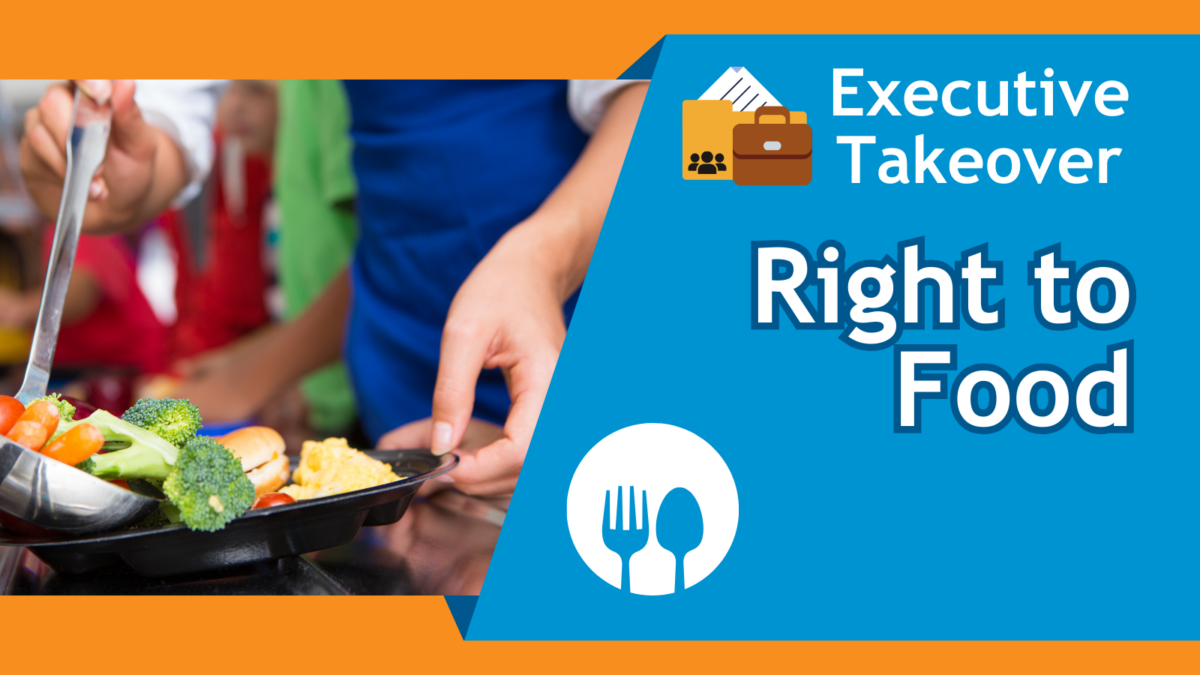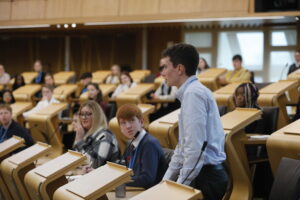At the Annual Children and Young People’s Executive Takeover 2023, Omar Taher MSYP and Millie Wright MSYP gave a speech to the Permanent Secretary, Directors-General and other civil servants on the Right to Food.
You can read our speech below:
It is evident that up to 783 million people faced hunger across the world in 2022, proven by the World Bank organisation. In a world with 8 billion people, it shocks me how so many people are starving because they cannot access a basic fundamental right – the right to food. I see the growing conflict and natural disasters across the world, and we cannot deny the impact this has on our food system or the people living in places such as Gaza, Libya, Sudan, Congo, Somalia, Afghanistan, Yemen and even my home country – Syria.
Focusing on Scotland, you would expect everyone would have access to their right to food. Nonetheless, Trussell Trust produced a shocking report showing that 1.2 million people in Scotland experienced food insecurity between mid-2021 and mid-2022. Food insecurity is fundamentally connected to poverty. We know certain groups of people are more likely to be in poverty, such as ethnic minorities, people with disabilities or care-experienced people to name a few. Therefore, these people are disproportionately disadvantaged and hungry.
The Scottish Government has the ambitious target of reducing child poverty to less than 10% in 2030. Well, it’s 2023 and around one quarter of Scotland’s children are living in poverty. We shouldn’t have to wait for child poverty to end to ensure as many people as possible are fed. We must ensure young people are fed whilst they are growing and learning so they can have better life outcomes. We must make sure my generation are not left behind, starving and unequal. These are big ambitions but high stakes, as the current situation is abhorrent. Young people are essential for achieving this work.
Since we last spoke, the Scottish Youth Parliament has conducted research into young people’s views on how their right to food could be achieved by consulting with 846 young people. Today, we would like to share the results with you.
Research has shown time and time again the links between nutrition and cognitive performance in people, as those who have inadequate nutritional intake have problems surrounding their concentration, memory, problem-solving skills and overall brain functioning.
Can you imagine trying to complete a test, exam, or assignment when you haven’t been able to eat a nutritionally balanced meal or even a meal at all? Studies have shown that even missing a meal can make you feel lethargic and weak due to your body running low on its immediate glucose supply.
We therefore recommend universal free school meal programmes are implemented as soon as possible. We would also like to see the same positive commitment to pupil’s right to food who are in secondary schools as there has been for primary pupils.
In the Scottish Youth Parliament’s Young People’s Right to Food Report in March 2023, 86% of the 850 young people consulted with said that universal free school meals was a key way to uphold their right to food.
The National Union of Students (NUS) Scotland has shown that 52% of students in Scotland have skipped a meal due to a lack of money and 11% have used a foodbank. This highlights how much university students are struggling due to the cost-of-living crisis. As the NUS Scotland President stated, “further and higher education is free in Scotland because we want our education system to be accessible to all, but if students cannot afford to live whilst accessing that free education, we have failed to make it so”. I would therefore recommend that especially during exam periods, measures should be put into place to ensure students can get more help to make certain that they are not going hungry and therefore are not able to perform as well in exams or assignments.
The Good Food Nation (Scotland) Act states that it aims for everyone in Scotland to have access to healthy, nutritious food. In the Right to Food Report, over 75% of respondents stated that they would be more likely to eat lunch at school if the school meals were free. School meals must meet the requirements under the Nutritional Requirements for Food and Drink in Schools (Scotland) Regulations. So, universal free school meals would prevent young people from buying cheaper, unhealthy alternatives that aren’t nutritionally balanced.
Another way to increase school meal uptake, is for young people to be meaningfully involved in decisions surrounding the content and quality of school meals, which would uphold young people’s rights under article 12 of the UNCRC. Involving young people when creating the contents of school meals can make sure they are shaped by the lived experience of those accessing it.
Scotland: a multicultural nation comprised of individuals of various nationalities and faiths with every member of our community expecting to feel secure and included. However, in terms of food, dietary requirements aren’t always supported, which can make people feel excluded. In my capacity as a practicing Muslim, I can solely testify to my personal struggles in locating halal meat or food that is both reasonably priced and free of alcohol and pork, including pork gelatine. Similarly, others who may observe kosher, vegetarian, vegan, pescatarian, or other dietary restrictions or allergies can also find it hard to find food that is accessible and reasonably priced for them.
Asking for dietary requirements so you can access food can be uncomfortable. But stigma around asking for help is much worse. In fact, in our Young People’s Right to Food Report, we found out that almost 50% of young people believed there was stigma associated with asking for help. It is also important to note that we found another barrier is that 60% of young people do not even know where to go to access food if they were struggling. In fact, one young person had told us “people find it embarrassing to ask for food”.
Being a government that many look up to, I find it disheartening that the issue of food poverty is still afloat. Universal free school meals would help solve both of these problems, but in its absence, it is even more important that awareness should be raised surrounding local programmes and initiatives that support food access and reduce stigma. We don’t want to be in a society that leaves our must vulnerable unable to access help.
Through the cash-first approach towards ending the need for food banks, the Scottish Government have committed to supporting people and families to access food in a way that maximises dignity and choice. The same commitment needs to happen in the delivery of how young people access their right to food. We heard from young people that universal free school meals would increase healthy school meal uptake and reduce stigma.
If universal free school meals cannot be provided, you must do all you can to support other policies that ensure no one falls through the gaps of accessing targeted free school meals and they have support during holidays, that young people know how to access help and don’t face stigma, and everyone has access to nutritious food that fits their dietary requirements. You can only maximise the dignity and choice of young people by listening to them.
Many of these conversations should be happening in schools and local authorities, but it is important that they hear this is a priority for you. We suggested that the Scottish Government create Good Practice Guidance to support young people at schools to participate in their school meals. We would love to discuss this further. We’ve spoken to young people about their experiences of food poverty, now we are asking you to consult and promote young people’s dignity and choice over their right to food in education too.
Please respect what our right to food looks like for us.



